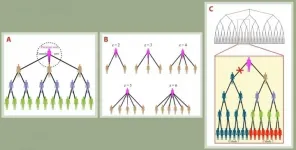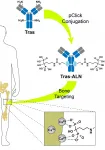(Press-News.org) SAN ANTONIO, June 23, 2021 - A typical Western high-fat diet can increase the risk of painful disorders common in people with conditions such as diabetes or obesity, according to a groundbreaking paper authored by a team led by The University of Texas Health Science Center at San Antonio, also referred to as UT Health San Antonio.
Moreover, changes in diet may significantly reduce or even reverse pain from conditions causing either inflammatory pain - such as arthritis, trauma or surgery - or neuropathic pain, such as diabetes. The novel finding could help treat chronic-pain patients by simply altering diet or developing drugs that block release of certain fatty acids in the body.
The paper, more than five years in the making, was published in the June edition of the journal Nature Metabolism by a collaborative team of 15 local researchers, headed by first co-authors Jacob T. Boyd, MD, PhD, and Peter M. LoCoco, PhD, of the Department of Endodontics at UT Health San Antonio.
In all, 11 of the co-authors are from UT Health San Antonio, including seven current or former students of its Graduate School of Biomedical Sciences; three represent the Department of Chemistry at the University of Texas at San Antonio; and one is from the Department of Neurology with the South Texas Veterans Health Care System.
"This study exemplifies team science at its best - multiple scientists and clinicians with complementary expertise working together to make lives better," said Kenneth M. Hargreaves, DDS, PhD, professor and chair of the Department of Endodontics at UT Health San Antonio, and senior author of the paper.
Fatty acids and pain
Chronic pain is a major cause of disability around the world. But although fat-reduction often is advised to manage diabetes, auto-immune disorders and cardiovascular diseases, the role of dietary lipids, or fatty acids, in pain conditions has been relatively unknown.
In the new paper, Dr. Boyd and his colleagues used multiple methods in both mice and humans to study the role of polyunsaturated fatty acids in pain conditions. They found that typical Western diets high in omega-6 polyunsaturated fats served as a significant risk factor for both inflammatory and neuropathic pain.
Omega-6 fats, mainly found in foods with vegetable oils, have their benefits. But Western diets associated with obesity are characterized by much-higher levels of those acids in foods from corn chips to onion rings, than healthy omega-3 fats, which are found in fish and sources like flaxseed and walnuts.
Generally, unhealthy foods high in omega-6 fats include processed snacks, fast foods, cakes, and fatty and cured meats, among others.
Reversal of this diet, especially by lowering omega-6 and increasing omega-3 lipids, greatly reduced these pain conditions, the researchers found. Also, the authors demonstrated that skin levels of omega-6 lipids in patients with Type 2 diabetic neuropathic pain were strongly associated with reported pain levels and the need for taking analgesic drugs.
"This paper is a high-profile contribution for a huge unmet translational need as there are no treatments altering the nature of this neurological disease," said José E. Cavazos, MD, PhD, professor of neurology, assistant dean and director of the National Institutes of Health-designated South Texas Medical Scientist Training Program at UT Health San Antonio.
In an editorial accompanying the paper, Duke University researchers Aidan McGinnis and Ru-Rong Ji wrote, "This comprehensive and elegant study from Boyd et al. may serve as a foundation for new clinical trials and ultimately provide new avenues for the clinical treatment of neuropathies."
INFORMATION:
The research paper is titled, "Elevated dietary ω-6 polyunsaturated fatty acids induce reversible peripheral nerve dysfunction that exacerbates comorbid pain conditions," by Jacob T. Boyd, Peter M. LoCoco, Ashley R. Furr, Michelle R. Bendele, Meilinn Tram, Qun Li, Fang-Mei Chang, Madeline E. Colley, Grace M. Samenuk, Dominic A. Arris, Erin E. Locke, Stephan B. H. Bach, Alejandro Tobon, Shivani B. Ruparel and Kenneth M. Hargreaves.
The University of Texas Health Science Center at San Antonio, also referred to as UT Health San Antonio, is one of the country's leading health sciences universities and is designated as a Hispanic-Serving Institution by the U.S. Department of Education. With missions of teaching, research, patient care and community engagement, its schools of medicine, nursing, dentistry, health professions and graduate biomedical sciences have graduated 39,700 alumni who are leading change, advancing their fields, and renewing hope for patients and their families throughout South Texas and the world. To learn about the many ways "We make lives better®," visit http://www.uthscsa.edu.
Stay connected with The University of Texas Health Science Center at San Antonio on Facebook, Twitter, LinkedIn, Instagram and YouTube.
To see how we are battling COVID-19, read inspiring stories on Impact.
By José Tadeu Arantes | Agência FAPESP – Mathematical models that describe the physical behavior of magnetic materials can also be used to describe the spread of the novel coronavirus that causes COVID-19.
This is the conclusion of a study conducted in Brazil by researchers affiliated with São Paulo State University (UNESP) in Rio Claro and Ilha Solteira and reported in an article published in Physica A: Statistical Mechanics and its Applications.
The study was part of a project led by Mariano de Souza, a professor at UNESP’s Rio Claro Physics Department, and of the PhD research of Isys Mello, whose thesis advisor is Souza, last author of the article. Another co-author is Antonio Seridonio, a professor at UNESP’s Ilha Solteira Physics ...
Only 1 in 10 older adults in a large national survey who were found to have cognitive impairment consistent with dementia reported a formal medical diagnosis of the condition.
Using data from the Health and Retirement Study to develop a nationally representative sample of roughly 6 million Americans age 65 or older, researchers at the University of Michigan, North Dakota State University and Ohio University found that 91% of people with cognitive impairment consistent with dementia told questioners they had a formal medical diagnosis of Alzheimer's disease or dementia.
"(The discrepancy) was higher than I was expecting," ...
Flavoring can change how the brain responds to e-cigarette aerosols that contain nicotine, according to Penn State College of Medicine researchers. Andrea Hobkirk and her team used functional magnetic resonance imaging (MRI) to understand how the brain's reward areas react to e-cigarette aerosol with and without flavor.
"There are nearly 12 million e-cigarette users in the United States," Hobkirk, an assistant professor of psychiatry and behavioral health at Penn State College of Medicine, said. "The vast majority use e-cigarettes with menthol, mint, fruity and dessert-type flavors. Although regulations that limit the sale of flavored e-cigarettes may help curb use among youth, they might also stop adults from using e-cigarettes as a smoking ...
Researchers from Bentley University have been exploring how readers at partisan news sites respond to news events that challenge their worldview.
In a forthcoming paper in the journal ACM Transactions on Social Computing, they report results of a study that examines reader comments on stories surrounding the 2017 Roy Moore Alabama senate race at two partisan news sites: a left-leaning news site (Daily Kos) and a right-leaning news site (Breitbart). They consider the alleged sexual misconduct of Mr. Moore as a challenging news event for the right-leaning readers; and the subsequent nomination of Mr. Moore as the Republican candidate as a challenging news event for the left-leaning readers.
Their analysis identifies the obstacles that readers face as they try to make sense ...
NEW YORK CITY, June 23, 2021 -- From amoebas to zebras, all living things evolve. They change over time as pressures from the environment cause individuals with certain traits to become more common in a population while those with other traits become less common.
Cancer is no different. Within a growing tumor, cancer cells with the best ability to compete for resources and withstand environmental stressors will come to dominate in frequency. It's "survival of the fittest" on a microscopic scale.
But fitness -- how well suited any particular individual is to its environment -- isn't set in stone; it can change when the environment changes. The cancer cells that might do best in an environment saturated ...
SAN FRANCISCO, CA--June 23, 2021--A healthy heart is a pliable, ever-moving organ. But under stress--from injury, cardiovascular disease, or aging--the heart thickens and stiffens in a process known as fibrosis, which involves diffuse scar-like tissue. Slowing or stopping fibrosis to treat and prevent heart failure has long been a goal of cardiologists.
Now, researchers at Gladstone Institutes have discovered a master switch for fibrosis in the heart. When the heart is under stress, they found, the gene MEOX1 is turned on in cells called fibroblasts, spurring fibrosis. Their new study, published in the journal Nature, suggests that blocking ...
HOUSTON - (June 23, 2021) - Bone cancer is hard to treat and prone to metastasis. Research teams at Rice University and Baylor College of Medicine have a new strategy to attack it.
Chemist Han Xiao at Rice and biologist Xiang Zhang at Baylor and their labs have developed an antibody conjugate called BonTarg that delivers drugs to bone tumors and inhibits metastasis.
Their open-access study, which appears in Science Advances, shows how Xiao's pClick technology can be used to link bone-targeting antibodies and therapeutic molecules.
In experiments, they used pClick to couple a molecule used to treat osteoporosis, alendronate, with the HER2-targeting antibody trastuzumab used to treat breast cancer and found it significantly enhanced the concentration ...
Most survivors of squamous cell head and neck cancers report that their sense of taste is dulled, changed or lost during radiation treatment, causing them to lose interest in eating and diminishing their quality of life.
In a study of taste and smell dysfunction with 40 cancer survivors, scientists at the University of Illinois Urbana-Champaign found that the tips of these individuals' tongues were significantly less sensitive to bitter, salty or sweet tastes than peers in the control group who had never been diagnosed with cancer.
In a paper published in the journal Chemical Senses, the U. of I. team said this diminished taste sensitivity suggested that the taste ...
In New England, constraints in the supply of natural gas have led to nearly a quarter of all unscheduled power plant outages. In a new study, researchers used data from power plant failures in the 2010s to develop a supply curve of the costs required for generators to mitigate fuel shortages in the region. The study found that storing both oil and gas on-site could reduce dependence by power plants on gas grids in geographic areas with few pipelines.
The study was conducted by researchers at Carnegie Mellon University (CMU), The Pennsylvania State University, and the North American Electric Reliability Corporation. It is published in The Electricity Journal.
"Gas ...
Toronto - Last winter, Goldman Sachs reported it was working to make things better after a group of junior analysts revolted against 100-hour work weeks.
That's a smart thing to do, suggests a new study from the University of Toronto's Rotman School of Management. Drawing from more than 6,000 employee reviews of their workplaces and data on their firms' forecasting accuracy, the research shows that making improvements to hardworking analysts' work-life balance produces dividends for the company and for the analysts' careers.
"There is a lot of anecdotal evidence, but here we provide large-scale evidence that supports the recent push to grant these employees at least some reprieve from the extremes of their jobs," said Ole-Kristian Hope, who is the Deloitte Professor of Accounting ...




